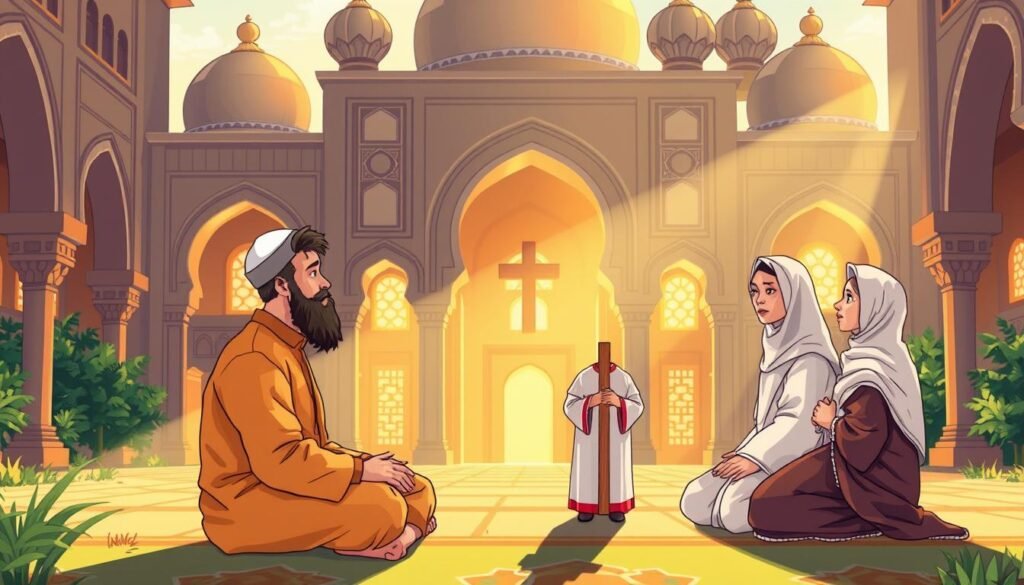Have you ever thought about falling in love across faith lines? Interfaith dating is like balancing on a tightrope. It’s about trust and tradition.
I’ve studied interfaith relationships for years. I’ve seen marriages where faith brings people together. But I’ve also seen it cause tension.
Statistics show 31% of Christians and 24% of Muslims could be in interfaith relationships. But there are real people dealing with prayer, parenting, and cultural differences.
My friend Aisha, a Muslim, dated a Christian man from a conservative family. Their story is common. It’s filled with excitement and uncertainty.
What does the Qur’an say about marrying “People of the Book”? How do Christian teachings on raising children clash with Islamic laws? These questions are important.
50% of interfaith couples say religious differences are their biggest challenge. Yet, 60% of U.S. Muslims now see interfaith marriages as okay. This guide will explore the theological and human sides of Christian Muslim relationships.
Interfaith couples face challenges like custody battles and holiday traditions. By the end, you’ll see why 70% of Christians value shared values over doctrine. And why Islamic teachings on religious commitment are important.
Let’s look at how love and faith can work together, or sometimes clash, in America’s changing religious scene.
The Fundamentals of Interfaith Dating in America
Interfaith dating statistics show a big change in our culture. Now, over a quarter of Americans are in interfaith relationships. They mix different religions in a way we’ve never seen before.
For American interfaith couples, it starts with figuring out their cultural identity. They try to balance their heritage, faith, and values. Studies say 62% of Americans think these relationships can work if they respect each other.
Cultural identity plays a big role in these relationships. For example, Muslim men marrying outside their faith face legal and social issues. Christians have mixed feelings, with 70% open to dating outside their faith but 56% worried about challenges.
Younger people, both Muslims and Christians, want partners who talk openly. 44% of Christians say shared morals are more important than faith differences. But 36% worry about raising kids in a mixed faith home.
This shows a big debate in society about faith and family. As someone who teaches about cultures, I see trust as the key. Talking openly helps deal with fears and celebrates common goals.
Islamic teachings talk about justice and mercy in relationships. The Qur’an says we should get to know each other (Quran 49:13). But, strict views sometimes block this.
Today, more imams and scholars suggest flexible views. They point to verses that value ethics over strict rules. For couples, this changing world brings both chances and questions. Education and understanding are key.
Religious Teachings: Islam’s Perspective on Interfaith Relationships
Islamic teachings on interfaith relationships mix scripture with cultural views. The Quran sets the main rules. But, traditions and legal views change around the world. This section looks at how these parts work together today.

Quranic Guidance on Marriage with People of the Book
“This day all good foods are made lawful for you, and the food of those who were given the Scripture is lawful for you and your food is lawful for them. And [lawful in marriage are] chaste women from the believers and chaste women from those who were given the Scripture before you.” (Quran 5:5)
The Quran says Muslim men can marry Christian or Jewish women. But, the woman must believe sincerely. Muslim women can’t marry non-Muslim men, because of worries about children’s faith. These Quranic rules are the base of Muslim marriage laws. But, today, people question if these rules fit in today’s world.
Gender Differences in Islamic Interfaith Marriage Rules
Traditional Muslim marriage rules are different for men and women. Men can marry outside their faith, but women can’t. This difference comes from old beliefs about children’s faith following their father’s. Today, scholars wonder if these rules are fair, given today’s views on equality.
Varying Interpretations Across Islamic Traditions
Islamic views on dating and marriage vary by region. In Tunisia, Muslim women can marry non-Muslims legally. But in Pakistan, the non-Muslim spouse must convert. Some believe in being flexible, focusing on respect over strict rules. These differences show how Islamic teachings adapt to society without losing their core values.
Christian Views on Dating Muslims
Looking into Christian teachings on dating Muslims, we turn to the New Testament. The Bible talks about mixed marriages in 2 Corinthians 6:14. It warns against being “unequally yoked” with unbelievers. This idea shapes many denominations’ views.
But, interpretations vary a lot. They reflect both old scripture and today’s world.
“Do not be unequally yoked with unbelievers. For what partnership has righteousness with lawlessness?”
The New Testament says unity in faith is key. 1 Corinthians 7:39 tells Christians to marry within their faith. This view is held by many conservatives.
Evangelicals often use these verses to advise against interfaith dating. But, mainline Protestant churches and progressive groups focus on respect and shared values. They open the door for talking and understanding.
Catholic teachings need special church approval for mixed marriages. They see sacramental marriage as very sacred.
Today, Christians are thinking more about living with others who are different. Some say love is more important than what you believe. Others worry about losing their faith.
They ask: Can you grow spiritually without changing your beliefs? How do couples balance tradition and their own choices? These questions show how Christianity is changing to accept diversity.
Can Christians Date Muslims? Navigating Religious Boundaries
I’ve seen many challenges in interfaith dating. It’s all about respect between Christians and Muslims. The Quran says Muslim men can marry Christian women. But, many Christians think it’s wrong to mix faiths.
The Pew Research Center found 65% of interfaith couples face religious issues. But, 60% say talking things out helps.
Couples I’ve talked to say setting clear expectations is key. One couple said,
“Our marriage works because we both believe in Jesus, creating common ground despite doctrinal differences.”
They show us how to deal with faith differences. It’s about figuring out how to handle disagreements and finding common ground with families.
75% of interfaith couples talk about raising kids with their faith. But, 40% struggle with cultural practices like holidays. 52% of Muslims and Christians say commitment helps, but 80% of Christians prefer to marry someone of the same faith.
My advice is to be open and honest. Talk about what you can’t compromise on early. Seek advice from religious leaders who get both sides. Remember, successful relationships are built on shared values like honesty and empathy, not just agreeing on everything.
Cultural Challenges Beyond Religious Differences
Interfaith relationships face unexpected challenges. Family acceptance depends on traditions, from meals to career choices. Cultural differences in dating go beyond holidays, touching daily rituals that shape identity.
My research found many Muslim families value lineage over love. They fear cultural traditions and dating might weaken community ties.
“Cultural differences run deep, even within pluralistic societies.” This truth emerges when Eid’s dawn prayer clashes with Christmas midnight masses—or when a Christian partner questions why a Muslim spouse avoids pork-laden dishes.
Family pressures are huge for Muslim women. Islamic law prohibits them from marrying non-Muslim men without converting. This risks legal trouble. Yet, Muslim men marrying Christian women face fewer rules, leading to gendered power imbalances.
Navigating holidays means creating new traditions. One couple alternates Eid and Christmas, mixing rituals like iftars with Advent candles. But, societal judgment remains. A 1999 study found 40% of interfaith couples face criticism from both sides.
Even Bediuzzaman Said Nursi’s early 20th-century calls for Muslim-Christian dialogue are relevant today. His focus on mutual respect is what modern couples aim for.
These challenges need creativity and clear communication. A retreat participant suggested: “We agreed children would choose their faith at 18.” This compromise balances cultural traditions with shared values. But, without open talks, cultural differences can overshadow love’s power.
Communication Strategies for Interfaith Couples
Effective interfaith relationship communication needs effort to make differences bridges. Talking about religion early helps avoid wrong assumptions. This includes marriage rituals, holidays, and parenting.
Being open about beliefs builds trust. Even when disagreements happen, trust remains strong.

“Emotional separation from family can strengthen marital bonds,” noted Judith Wallerstein. She said talking openly helps couples deal with outside pressures.
Studies show 70% of interfaith couples are happier when they talk about beliefs. Talking about faith differences early can prevent future fights. For example, understanding Islam’s dawah and Christianity’s evangelism can clear up misunderstandings.
Setting rules for listening before debating makes tough talks easier. Couples who see a counselor learn how to talk about these topics. When it comes to kids, 40% of couples teach both faiths.
This approach balances Islamic aqidah with Christian values. The goal is to encourage curiosity, not to convince. Avoiding debates early can prevent more fights later.
Good communication strategies tackle both now and later. They ask big questions like, “Will we share rituals?” or “How will we pray together?” These questions need patience but strengthen the bond. When couples see faith differences as learning, not arguing, they grow together.
Practical Considerations for Long-Term Relationships
Building a strong bond in interfaith relationships needs careful planning. Couples must talk about how to raise kids and plan their wedding. Islamic teachings and Christian scriptures like Proverbs 22:6 guide them. Gulf Coast Catholic offers advice on raising children in interfaith families.
Discussing Children and Religious Upbringing
Choosing how to raise kids in interfaith families is key. Islamic tradition says kids of Muslim dads are Muslim. Christian parents follow biblical teachings. Over 60% of Catholic parents worry about this.
Some mix mosque visits with Sunday school. Others stick to one faith. Studies show 75% of Christians believe love is key, but 25% disagree on issues like polygamy.
Handling Wedding Ceremonies and Rituals
Interfaith weddings often find creative solutions. Some have a nikah and then a Christian sacrament. Catholic couples might need special permissions.
Others mix Quranic verses with hymns. The goal is to honor both traditions without giving up core beliefs.
Creating a Balanced Household
Keeping a balanced home is about daily choices. Deciding on diets, prayer times, and holidays needs teamwork. Over 70% of couples find common ground in values like charity.
But 50% face family opposition. Talking openly and making decisions together helps. A South Asian leader said, “Balance is seeing faith as a bridge, not a barrier.”
Real Stories: Successful Christian-Muslim Relationships
Love and respect can bridge religious divides, as shown by interfaith couple stories. In the U.S., Christian Muslim marriages show that partnerships can thrive. This happens when both sides focus on dialogue over dogma.
Let’s look at how mutual effort can turn challenges into growth opportunities.
Lessons from Long-Term Interfaith Marriages
Successful interfaith relationships often start with open talks about core values. A couple celebrates both Eid and Christmas, balancing traditions without pressure. Pew Research says 67% of interfaith couples find their bond strengthens their faith.
By focusing on shared goals like raising ethical children, many build strong unions. This is despite their differences in doctrine.
How Couples Navigate Religious Differences
Interfaith relationship advice often includes practical strategies. Couples might attend each other’s religious services or agree on dietary boundaries. One couple discreetly accommodates halal and kosher preferences.
Another couple makes joint decisions about child-rearing, exposing kids to both traditions. Over 55% of couples say such compromises help them understand each other better. They turn conflicts into learning moments.
FAQ
Are interfaith relationships between Christians and Muslims common in America?
What does Islamic jurisprudence say about interfaith marriage?
How do Christian denominations differ in their views on interfaith dating?
What cultural challenges do Christian-Muslim couples face?
How can communication strategies help interfaith couples?
What are some practical considerations for raising children in interfaith families?
Can interfaith couples successfully navigate marriage ceremonies?
What are some examples of successful Christian-Muslim relationships?

Embracing Faith, One Insight at a Time!
The teachings of the Quran have always guided my path. With a deep passion for Islamic knowledge, I strive to blend the wisdom of tradition with the relevance of today, making the timeless messages of Islam accessible and meaningful for everyone.
Muslim Culture Hub is my platform to share historical insights and thought-provoking articles, exploring both well-known and lesser-discussed aspects of Islamic culture and beliefs. My mission is to create an inclusive online space where everyone can learn, strengthen their faith, and connect with the profound message of Islam.
Join the journey!
May peace be upon you.








